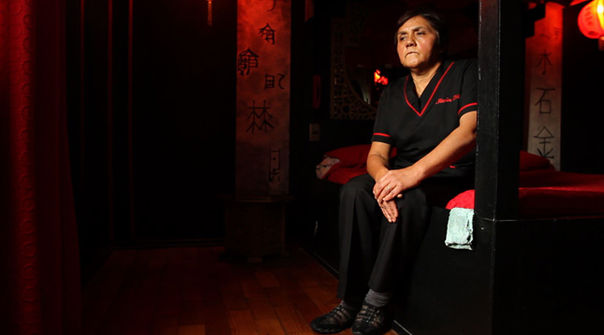The Uncertainty of the Synopsis
Raciel del Toro Hernández of the 2013 Guadalajara Talent Press reviews Patricia Correa's and Valentina Mac-Pherson's documentary LAS MUJERES DEL PASAJERO.

Patricia Correa's and Valentina Mac-Pherson's documentary LAS MUJERES DEL PASAJERO.
Even though Fernando Trueba categorically declared during the opening Master Class of the 5th Talent Campus Guadalajara, that in order to produce films nowadays, it was necessary to complete and complete again – as if a never-ending cycle – far too many documents (and he may be right), I am sure that he, knowing that promotion is crucial in a movie's development, would never neglect essential elements like posters, tempting trailers or a suggestive synopsis. At least the producer or the promoter would demand that.
Among all those documents, the synopsis is like a beauty mark on the film's body. And from the moment it was born and started to grow, it held on; the synopsis is the door that invites the spectator – hesitating before the several proposals present at a film festival such as Guadalajara's – to discover which is the image threshold on which one would like to walk.
A synopsis like the one about the documentary LAS MUJERES DEL PASAJERO, the first film directed by Patricia Correa and Valentina Mac-Pherson, is not enticing at all. Contemplations about love are one of the most recurrent topics in cinema. Why would we want to listen to it again from the mouths of four motel maids? They have to convince us.
Nevertheless, it was such a pleasant surprise to discover a documentary that uncovered fresh humor in an environment that even the filmmakers considered sordid: a motel where lovers came to express their most intense passions and their most inaccessible prejudices. The synopsis started to become deceitful.
Both filmmakers revealed pleasing characters, who reached empathy with the spectator. But as everything else in life, we are forced to choose, and as the narration goes on, one character grows and the others are diminished, or vanish; I wanted to keep listening to the maid Elizabeth, and I even forgot the names of the others. The filmmakers intended to give a voice to four different experiences, but they also ended up choosing and three out of four stories were dissolved in sweaty moans and panting from the clients at the motel.
We know that documentary films are not reality. The pioneers of this cinematographic modality never intended to film reality, just like when Robert Flaherty asked Nanook to exaggerate his life before the lens, or like Dziga Vertov questioning the social function of MAN WITH A MOVIE CAMERA. The documentary is just a part of reality, construed and manipulated, through which the filmmaker chooses a point of view towards some event. And even though that position is manifested from the moment of choosing the topic, the documentarist must leave the cinematographic language to the story's mercy.
That is what I disdained about LAS MUJERES DEL PASAJERO: the persistent dull details about vomit on the pillow, the dirt, the cigarettes butts, the moment when the actions of the same characters don't manifest that revulsion upon which the images gloat over; the overexposure of the love cries before the obvious indifference of the maids; the explicit manipulation, for I know very well that I am being manipulated since the beginning (and I accept it). Documentary films don't have to be the truth, but they definitely must be truthful.
In spite of not having the camera in the hand but always on ground level, as if a diminished intruder that does not want to invade the lovers' private space; in spite that there is not a reporter putting the microphone to the interviewee's face, but an observational tone instead that seems not to want to take part in it; LAS MUJERES DEL PASAJERO left me with the displeasure of a news article that found a good story and, always loyal to its impression of an interpretative journalistic genre, proposes several views, contextualization, and even the opinion of the filmmakers, but leaves the spectator, alone, to make the final choice.
One of the maids confessed that she got married without being in love; another told how she begged to her husband's feet when he left her for another woman; Elizabeth wanted to experiment in her bed the adventures that she heard or imagined at work, but the her man is the one in charge and she doesn't dare to say those things, or she is not allowed to. Weren't we watching a documentary about love?
In LAS MUJERES DEL PASAJERO, the age-old machismo and the patriarchal dictatorship of what is "right" and what is "moral" emerge inevitably like an eternal ghost of the Latin-American realities; a scenario which Patricia and Valentina didn't consider pertinent to develop in their story, even though the love pursued by the maids blurred and heartbreak emerged like floating smoke from Tony Leung's cigarette, beautiful and withered at the same time, in IN THE MOOD FOR LOVE. The synopsis, perfidious, proved deceitful again.

